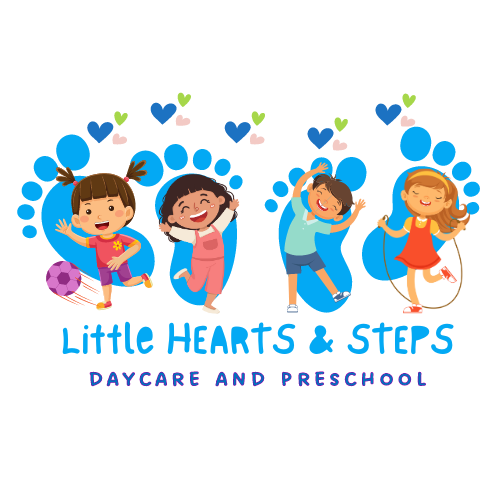


Language Arts
Each day, at Little Hearts and Steps Preschool, we utilize daily D.O.E-approved resources focused on language and literacy skill development to create a love for language, expression, reading, and, comprehension. We read aloud using our children’s book collection and Digital Children’s Library from a wide assortment of topics that explore life in other cultures, celebrate diversity, spark curiosity, and inspire children’s imaginations.

Reading and Writing
Research shows that becoming literate—learning the skills of reading and writing and using them to communicate—is a life-long process that begins at birth. The language of play has a strong and direct connection to reading and writing.
3K children will learn that writing is “talk written down.” A large part of learning takes place in informal situations and during center time. Children will be introduced to:
● Writing carries meaning
● the names of letters
● the identification of letters in varied contexts includes, but is not limited to, dramatic play, art, science, block building, and manipulatives.
3K children will learn that writing is “talk written down.” A large part of learning takes place in informal situations and during center time. Children will be introduced to:
● Writing carries meaning
● the names of letters
● the identification of letters in varied contexts includes, but is not limited to, dramatic play, art, science, block building, and manipulatives.

Math and Science
Science learning is a way for 3K students to find out about the world through exploration. They learn about the natural world, including the physical properties of things around them, as they interact with objects, people, and other living things. Through active investigation, the children will be encouraged to pose questions, seek answers, and develop solutions.
Number Sense and Operations ● develop an understanding of numbers, ways to represent numbers, and relationships among numbers ● begin to understand the meaning of the operations of addition and subtraction and how they relate to one another, for example, using counting in play ● begin to understand predictions and use estimation Algebraic Thinking ● understand patterns and relations, for example, by sorting and classifying ● understand mathematical properties such as bigger/smaller, more/less, heavier/lighter Geometry ● recognize properties and characteristics of geometric shapes ● understands location
Number Sense and Operations ● develop an understanding of numbers, ways to represent numbers, and relationships among numbers ● begin to understand the meaning of the operations of addition and subtraction and how they relate to one another, for example, using counting in play ● begin to understand predictions and use estimation Algebraic Thinking ● understand patterns and relations, for example, by sorting and classifying ● understand mathematical properties such as bigger/smaller, more/less, heavier/lighter Geometry ● recognize properties and characteristics of geometric shapes ● understands location

Social and Emotional Learning
“The preschool classroom is a laboratory for learning about... relationships. The children have opportunities to play and work with others, make choices and encounter consequences of those choices, negotiate social conflicts with language and develop countless other skills...” –Bredekamp, S. and Copple, C.
Throughout the school year, 3K children will be encouraged to:
● demonstrate increasing self-awareness and independence
● demonstrate confidence and positive self-image
● demonstrate initiative, cooperation, curiosity, and creativity in chosen learning activities engage in social relationships and develop connections and attachments to peers, classroom adults and to the larger community
Throughout the school year, 3K children will be encouraged to:
● demonstrate increasing self-awareness and independence
● demonstrate confidence and positive self-image
● demonstrate initiative, cooperation, curiosity, and creativity in chosen learning activities engage in social relationships and develop connections and attachments to peers, classroom adults and to the larger community

Art and Sensory
Painting/drawing • Using three dimensional materials • Making collages • Modeling with clay/Play Dough Staff should provide materials that students can use for creative expression through various artistic media and representations.

Technology and Computers
Students’ interdisciplinary learning and higher-order thinking can be supported through the appropriate exposure and use of technology. When used intentionally and in a developmentally appropriate manner, technology can enhance students’ learning experiences. Technology may be used to extend students’ knowledge of curricular content through interactive activities.
The ECERS-R programmatic assessment tool recommends that students’ use of technology tools should be limited to no more than 15 minutes per day and no more than 30 minutes per week. — Exceptions to this limit may be made for students with disabilities who require assistive computer technology as outlined in their Individualized Education Program (IEP).
Technology tools allowed in the classroom include:
— Computers
— Tablets
— Interactive whiteboards
— Mobile devices
— Cameras and recording devices
The ECERS-R programmatic assessment tool recommends that students’ use of technology tools should be limited to no more than 15 minutes per day and no more than 30 minutes per week. — Exceptions to this limit may be made for students with disabilities who require assistive computer technology as outlined in their Individualized Education Program (IEP).
Technology tools allowed in the classroom include:
— Computers
— Tablets
— Interactive whiteboards
— Mobile devices
— Cameras and recording devices

Empower Your Child's Speech Today
Let Little Hearts and Steps Daycare be the key to unlocking your child's full communication potential.
